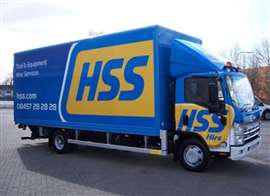Fewer sites, better returns: Inside HSS’s strategic reset under Overman
14 July 2025
HSS Hire, a familiar name to many in the UK construction and tool rental landscape, is undergoing a quiet transformation. Once known for its extensive physical footprint, the company is increasingly defined by a leaner network, data-driven logistics, and a hybrid digital strategy that reflects the shifting dynamics of the equipment hire market. HSS Operations chief executive Jon Overman outlines the thinking behind the changes to Lewis Tyler.
 Jon Overman, CEO of HSS’s traditional hire business, at the Rental eSummit. (Photo: Briggs & Stratton)
Jon Overman, CEO of HSS’s traditional hire business, at the Rental eSummit. (Photo: Briggs & Stratton)
It’s a long way from stacking shelves on Saturdays to reshaping the national footprint of one of the UK’s most recognisable hire businesses.
But Jon Overman, who began his career at HSS Hire as a weekend assistant, is now leading the operational overhaul of the company’s depot network—part of a broader restructuring aimed at sharpening efficiency and reimagining the business as a modern, data-led player in a shifting market.
“Over 27 years, we’ve been up to 500 [depots] and down to about 100,” says Overman. “A real sweet spot is around 150. Right now, we’ve got 117 concessions and 21 of our own depots doing the work for all of those concessions. We’ve also got a few more in build.”
Dual-pronged strategy
Founded in 1957 by Bert Taylor, the business has evolved far beyond its tool hire origins. Three years ago the firm separated into two divisions - HSS ProService, focussing on supplying large contractors, and HSS The Hire Service Company (THSC) which aims at attracting smaller customers and the DIY market. And today the company is pursuing a dual-pronged strategy aimed at sharpening operational efficiency while expanding digital reach.
The group announced in 2024 that CEO Steve Ashmore would step down from day-to-day operations, though he retains leadership of ProService as executive chairman and remains on the PLC board. In his stead, Jon Overman has taken the helm of HSS Operations, guiding a logistical recalibration that has seen the closure of 10 depots in Q4 2024 alone.
 Image: HSS Hire Group
Image: HSS Hire Group
The strategic realignment, which Overman characterises as a shift toward “performance-led growth,” is focused on serving high-demand areas more effectively.
“We believe what we’ve done will help maximise investor returns,” says Overman.
“Since shutting those depots, we’re actually doing more jobs from the ones we have than when we had 32. You put more kit into areas with higher demand... it’s where the customers need it.”
This reallocation has already seen £10 million (US$13.5 million) worth of equipment moved out of lower-demand locations to urban and infrastructure-rich hubs. “We’re covering about 95% of the country and doing it more efficiently,” he says. “The ones who want kit are getting what they need. In London, for example, there’s now more accessible equipment because of the density of work.”
The result, he says, is a more agile model with clearer capital discipline. “If you put a pound of equipment into a site like this, you can get a pound of gross profit back,” he adds. “At some of the closed depots, you’d only see 20 to 30 pence back… So while we’re still national, we’re more focused on a slightly smaller footprint that gives really good returns and lets us concentrate our efforts.”
Despite the closures, Overman is keen to stress that cost-cutting alone is not driving the changes. “They’re mostly legacy models, three to four thousand square feet, and they were inefficient,” he says. “In a modern depot, one manager can cover four drivers. In Norwich, you’d have two drivers and two managers. At a 24/7 depot like this one, you’d have one manager for four drivers.”
That efficiency, he argues, is non-negotiable in today’s environment. “With today’s inflationary pressures, efficiency is everything. If you’ve got a strong delivery network, you can win.”
Shift in footprint
The shift in footprint is also reflected in the company’s property strategy. Smaller depots in Sheffield and Hull have been consolidated into a single 100,000 square foot hub in Doncaster.
And the same can be seen in the HSS rental portfolio. “We’ve gone from about 3,000 products to 2,000 prime hire items,” Overman says. “We’re good at those… We can’t be all things to all people.”
Overman says the company is not ruling out further site closures but is prioritising investment in larger, better-equipped depots—so-called Customer Delivery Centres (CDCs)—that can support more volume with fewer resources.
“That gives a high level of customer service, which is really your differentiator. This market is still 60% independents because of the reliability they offer. If we can mimic that reliability nationally, that’s our winning formula.”
At Heathrow, one such CDC is already delivering up to 250 movements per day. “You’ve got to have good processes and systems that support them to be able to do volume that way.”
Meanwhile, HSS is expanding its presence via retail partnerships.
“We’ve opened 10 new concessions with builders’ merchants this year alone, with another 10–15 in build or spec,” says Overman.
 Photo: HSS
Photo: HSS
Among the most visible of these partnerships is one with UK-based buildings supplies merchant Selco, where HSS expects to expand to 32 sites this summer. The model, he says, is capital-light and scalable.
The company has also deepened its collaboration with on-demand platform TradeKart to enable sub-hour delivery for select products.
On the capex front, £8 million has already been invested in high-demand equipment—namely JCB diggers, dumpers and expanded powered access units.
“We’ve already added diggers and dumpers. The JCBs are coming in, so that’s on the periphery of what we do. The power access fleet has been extended too. We’ll go slightly higher up the range, but it’s still within the core rather than venturing into areas like portaloos.”
At the heart of the group’s long-term bet is its new hybrid structure. HSS Operations runs the physical infrastructure, while ProService acts as a digital broker platform.
“They’re our biggest customer,” Overman says. “We’ve got a right-of-first-refusal agreement. If a job comes up in their postcode, they offer it to us first. If we can’t do it, they go to their wider supply chain.”
He likens the offering to a rental marketplace akin to Deliveroo. “Shops can log in and book rehire gear like a customer would. One invoice from us, even if the digger comes from us and the portable toilets come from their supplier.”
He believes digital adoption will increase, but trust and service remain critical. “It’ll be hybrid. In 10 years, there will still be people who want to phone or walk into a store,” he says. “People also phone because they want recommendations. Maybe AI will help people get those answers quickly without needing to call. That’s how I see the evolution of hire. More tech, more trust, and more options.”
While ProService is growing rapidly, Overman agrees that getting so much business from one main customer - albeit one which is part of the same business - represents a risk. To broaden HSS’ customer base, he says, the firm is considering targeted acquisitions.
Reducing concentration risk
“They would help reduce our reliance on ProService, which, while still part of the group, represents a significant customer concentration,” he says.
The focus, he notes, is on niche players with defensible margins. “Businesses that are hard to replicate, maybe with little or no competition. Those are really interesting to us.”
Certainly, in recent years, HSS has suffered the fallout from relying heavily on one customer. Last year it lost a managed services contract with Amey which accounted for around 7% of the Hire Group’s revenue and 10% of adjusted EBITDA in 2023.
Financial performance, Overman concedes, has reflected the broader pressures facing the sector. “The market has been tough for 18 months. None of the quoted companies are delivering stellar results.”
Nonetheless, despite the difficult operating environment, Overman remains upbeat. “We’ve got a strong pipeline. There’s no silver bullet. You dust yourself off, tender, build new relationships.”
STAY CONNECTED



Receive the information you need when you need it through our world-leading magazines, newsletters and daily briefings.
CONNECT WITH THE TEAM









